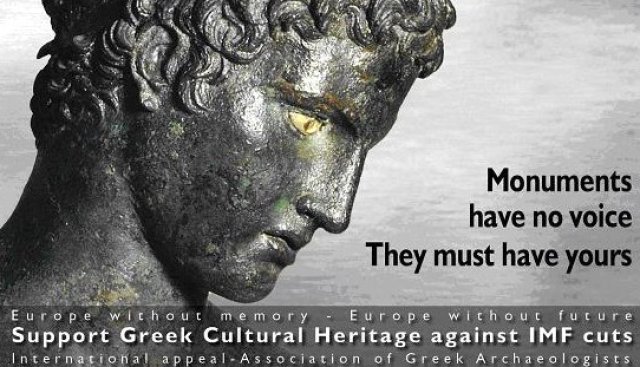
Greek archaeologists have launched an angry campaign to prevent their cultural and archaeological heritage from being destroyed by austerity measures. The campaign has attracted global support not just from archaeologists, but other anti-austerity campaigners and trade unionists.
In an act of defiant solidarity making international headlines, members of the Association of Greek Archaeologists (SEA) and the Greece Solidarity Campaign unfurled a banner reading “Can’t Pay, Won’t Pay — Solidarity with Greece” in that original hall of looted plunder, the Parthenon Gallery of the British Museum.
“If monuments had a voice of their own”, begins the SEA’s International Appeal, “they would tell us what has been going on in Greece in the past two years. In the name of the global economic crisis and with the IMF acting as a Trojan horse, austerity measures have been undermining public services, State welfare and social cohesion. Democracy and national dignity are under attack.”
Such an attack is not only metaphor. Alarmingly, there are increasing instances of extensive looting at museums. Despina Koutsoumpa, president of the SEA (and spokesperson for Greek heritage in a documentary by British solidarity activists), says the organisation has been registering a stream of missing cultural artefacts — including treasures from the Museum of Olympia, the site of the first Olympic Games thousands of years ago, stolen during an armed robbery.
This prompted the production of a confronting public awareness ad by the SEA, showing a little girl skipping through Athens Museum, who stands alone admiring a 2500 year old statue. A figure appears behind her, covering her mouth and snatching her away. She reappears, only to find the statue she so admired stolen. It was the statue, not the girl, that was the target.
In a recent Al Jazeera article, Nikolas Zirganos, an investigative journalist whose work resulted in the repatriation to Greece of “The Golden Crown of Macedonia” from the Getty Museum, stated the cuts in public spending ‘paved the way for a burgeoning illicit antiquities market’.
“These thefts are usually orders from specific rich collectors in Western Europe and the United States,” he stressed, despite the ministry of culture’s attempt to pass off burglaries as isolated events.
Greece’s minister of culture announced funding cuts of 20% for museum security staff, and personnel cuts of up to 50% at the ministry of culture and tourism, which currently employs 7000 people. At a time when unemployment stands at more than 21%, such cuts are devastating.
“Our scientific work has won international recognition,” the SEA declares. “We have organised excavations, studied Greek civilisation, organised museums not with stolen antiquities” — a crucial point, as many museums worldwide regularly acquire looted materials— “but with well-documented exhibits… As civil servants we have neither sought luxury, nor been accused of corruption, in sharp contrast to the practices of government and the political system that today promises to ‘save our country’.”
Statistics support the economic importance of heritage to Greece. The UN World Tourism Organisation ranks it as European Union’s seventh most visited country, and 16th in the world. About 15 million international tourists visited Greece in 2009. While heritage in the form of archaeological and historical sites, as well as museums, fuels this industry, it also has a flow-on effect to Greece’s service sector, which stands at a whopping 85% of the economy.
The absurdity is not lost on those who find themselves standing inside the cultural heritage austerity arena. “Forgive my ranting, please,” Stephen Miller, professor emeritus of Classical Archaeology at the University of California, Berkeley wrote in a March 19 letter to the SEA, “but the problem is so clear, and the solution so obvious that I am driven to frustration. I see a world where there is a need … for an adequate number of multi-lingual guards and guides at every site, every museum.
“At the same time I see hundreds of university graduates in archaeology who cannot find jobs. Isn’t the next step to put them to work in the context for which they have been trained?”
In reflecting a national distress, archaeologists are conscious of the march of austerity across borders. “As archaeologists in the land that bequeathed democracy to the world, we are perfectly aware of the dangers associated with the suppression of democracy. We are struggling to preserve the memory and material traces of the past, because we know that a people without memory are condemned to repeat the same mistakes again and again.”
As repeated by every archaeologist in this campaign, and by every person expressing their solidarity with them: the rich and their institutions have caused this crisis. And ordinary people are being bled dry to pay for it. The irony is palpable and heartbreaking. The stripping of cultural heritage to the highest bidder is an attack on the collective memory of an entire people, inherited from a time when democracy was being born.
In times of war and occupation, genocide and conquest, the cultural memories of the oppressed — statues, temples, artefacts, and even graves — are razed and looted. It is an outrage that a history that belongs to everyone can be left to crumble or to be bought and sold by those affluent enough to participate in an illicit market.
“We are making an urgent appeal, to all of Europe and the whole world, to everyone expressing their solidarity and support to the Greek people, to defend cultural heritage and historical memory. The peoples of Europe and the world share the same destiny. The austerity packages and authoritarian measures that are tearing apart Greece and its monuments are going to be imposed across Europe.”

Comments
Anonymous replied on Permalink